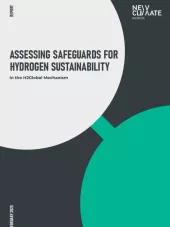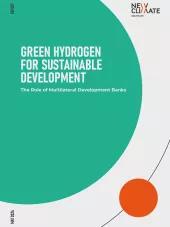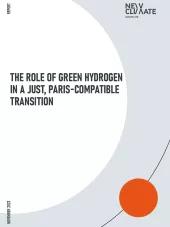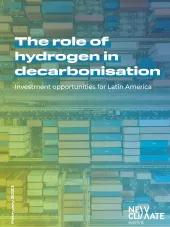The Federal Republic of Germany has identified hydrogen as a key lever for national decarbonisation and industrial transformation. In 2022, the Federal Ministry of Economic Affairs and Climate Action (BMWK) launched the Klimaschutzverträge (KSV) scheme to provide financial support to companies undertaking climate-friendly transformations (not only through hydrogen) in energy-intensive industries located in Germany. The instrument subsidises the additional costs of implementing such industrial decarbonisation projects, thereby helping Germany achieve its emissions reduction goals, industrial competitiveness, and hydrogen leadership.
This study assesses the extent to which the KSV instrument is designed to account for the various risks and opportunities associated with hydrogen production and use, including energy and resource efficiency, environmental and social safeguards, and impacts on hydrogen-exporting countries.
This study is part of a two-part series investigating auction mechanisms supporting hydrogen development. The corresponding paper in the series analyses the H2Global instrument.
Key Findings
- Eligibility of “Low-Carbon” Hydrogen
The German National Hydrogen Strategy (NHS) prohibits direct public funding for “low-carbon” hydrogen production, allowing support only for its use. The KSV thus keeps hydrogen production outside the funded project boundaries and focuses only on its use in industrial projects. However, this could contradict the NHS, as projects can still include hydrogen production costs in their bid prices, thus indirectly getting subsidies for “low-carbon” hydrogen production.
Future KSV funding rounds should explicitly exclude direct and indirect funding of fossil-based hydrogen.
- Incentives for Green Hydrogen
Green hydrogen was favoured in the first round of KSV funding due to its inherently lower lifecycle emissions and other cost incentives. However, a revised draft of the KSV Funding Directive suggests removing the emissions reduction criterion for bid evaluation, diminishing the competitive advantage of green hydrogen over “low-carbon” hydrogen.
We caution against this change and recommend significantly increasing the dynamisation surcharge and price risk coverage for green hydrogen and removing the price risk coverage for “low-carbon” hydrogen. We also recommend continuing to use a higher minimum emissions reduction threshold for “low-carbon” hydrogen than for green hydrogen and ensuring robust accounting of upstream emissions to signal a clear preference for green hydrogen.
- Energy and Resource Efficiency
If all lifecycle emissions are properly accounted for, the KSV bidding mechanism that incentivises cost minimisation should be sufficient to ensure the most energy- and resource-efficient outcome. However, it is unclear whether transport emissions from upstream hydrogen used in a project are accounted for. This could lead to transport emissions and associated energy losses not being fully reflected in bid prices.
We recommend explicitly accounting for emissions from transport to incentivise projects that prioritise hydrogen and derivatives produced close to the project location to the extent possible. Similarly, the bidding mechanism would also reflect the higher costs of inefficient uses of hydrogen, but this does not guarantee that such projects do not win contracts. It is thus necessary to implement additional safeguards to ensure that hydrogen is only used in projects or sectors where direct electrification is not a viable option.
- Raising the Bar on Sustainability
Projects using hydrogen produced in Europe are automatically subject to EU environmental and social regulations. However, projects importing hydrogen could potentially avoid obtaining certifications proving compliance with these EU regulations if not explicitly obliged to do so.
We recommend that Germany develop and adopt a holistic sustainability standard that not only includes environmental and social safeguards but also actively promotes value addition for local communities in hydrogen-exporting countries. The KSV Funding Directive should explicitly require all types of hydrogen, regardless of where it is produced, to comply with this holistic sustainability standard.
This work was funded by Deutsche Umwelthilfe.












